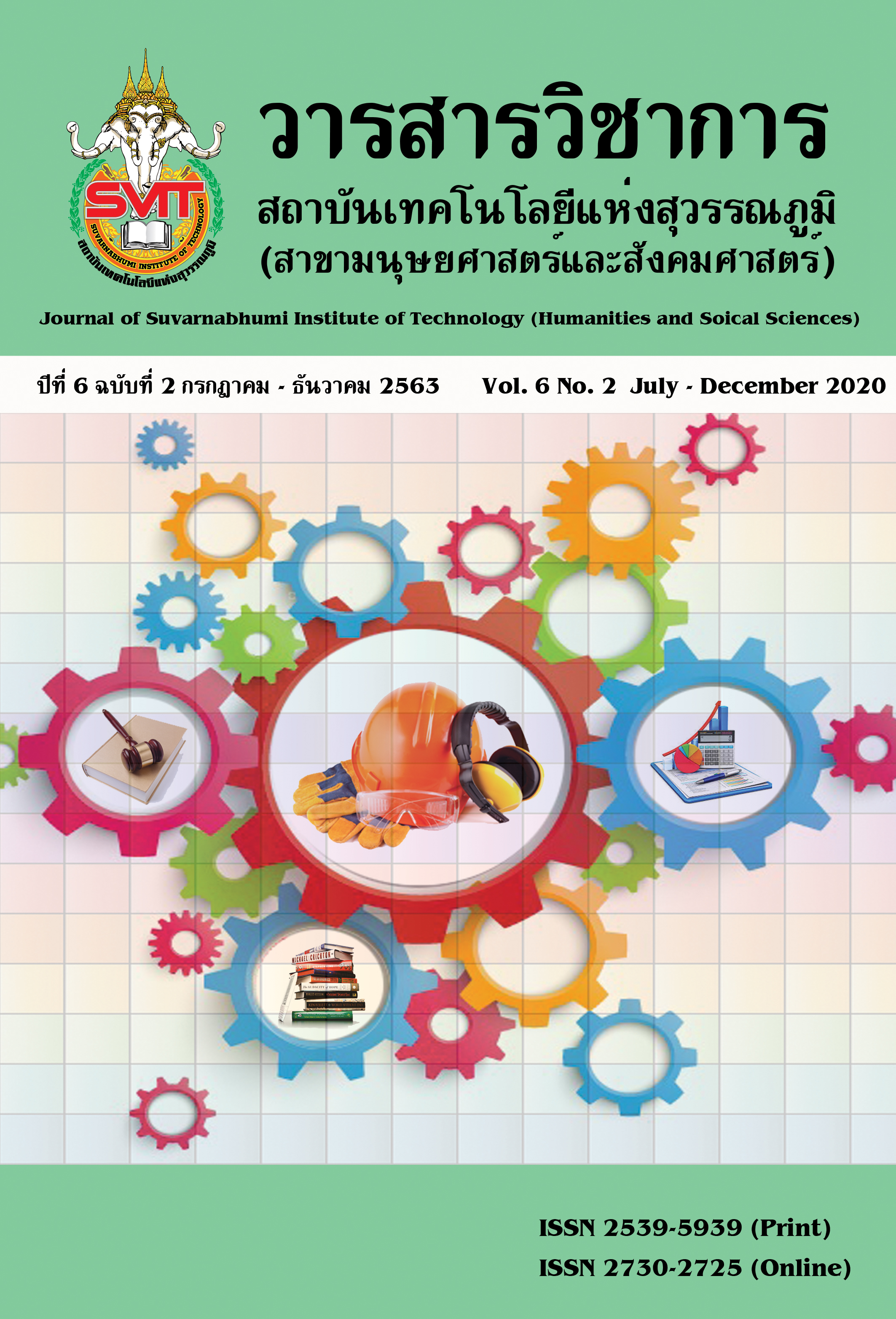ADMINISTRATIVE STRATEGY OF ACTIVE LEARNING FOR THE UNDERGRADUATE EDUCATION PROGRAM, RAJABHAT UNIVERSITIES IN THE WESTERN REGION
Keywords:
Administrative Strategy of Active Learning, Undergraduate Education Curriculum, Rajabhat Universities in the Western RegionAbstract
This research aims to: 1. study the problems and needs related to the administrative strategy of Active Learning for the Undergraduate Education Curriculum of Rajabhat Universities in the Western Region, 2. analyze and define the administrative strategy of Active Learning for the Undergraduate Education Curriculum of Rajabhat Universities in the Western Region, 3. reassure the administrative strategy of Active Learning for the Undergraduate Education Curriculum of Rajabhat Universities in the Western Region. The process of data collection was divided into 3 steps: Step 1: Selecting the target groups: the target groups include administrators, academics, instructors of the Undergraduate Education Curriculum in Rajabhat Universities in the Western Region. The tools employed in this research were: the analysis of documents, interviews, observations and note taking. The data was collected from: documents, Journals and relevant research articles. Field data was collected by: in-depth interviews, environmental analysis (SWOT Analysis), and evaluating of the situation within the organization (The McKinsey’s 7’S Model), analyzing the TOWS Matrix and analyzing the future overview using PESTEL Analysis. Step 2: Collecting data seventeen experts, the tool for data collecting was the Semi-structured questionnaires, data from 17 experts were analyzed and calculated to find the median, mode, and interquartile range. Step 3: Defining the administrative strategy of Active Learning: Twenty participants were invited to the meeting to define administrative strategy of active learning for the Undergraduate Education Curriculum of Rajabhat Universities in the Western Region. The qualitative data and the contents raised from the meeting were analyzed and presented.
The results of the research found that 1) there were five problems and needs in the following areas: 1.1 People 1.2 Financial management 1.3 Material management in the office 1.4 Management and control for effective work 2) Four administrative strategies were found, namely: Strategy 1, learners development with 6 methods, Strategy 2 instructor development with 7 methods, Strategy 3 university’s administrative development with 7 methods, Strategy 4 the development of technology, media, teaching and learning management and learning resources with 5 methods. 3) The meeting reached the consensus on all four strategies that they were appropriate and practicable.
References
กมล รอดคล้าย. (11 มิถุนายน 2561). ที่ปรึกษาด้านนโยบายและยุทธศาสตร์ สำนักงานปลัดกระทรวงศึกษาธิการ. [สัมภาษณ์.]
ณิรดา เวชญาลักษณ์. (2559). การบริหารจัดการชั้นเรียนเพื่อส่งเสริมการเรียนรู้ในศตวรรษที่ 21. วารสารบัณฑิตศึกษา, 13 (61), 11-20. สืบค้นเมื่อ 28 พฤษภาคม 2561, จาก https://tci-thaijo.org/ index.php/SNGSJ/article/view/66521/54417
ทัศน์ศรี เสมียนเพชร. (2556). การประเมินองค์ประกอบและการพัฒนากระบวนการเรียนรู้เชิงรุกของสถาบันอุดมศึกษาเพื่อเปลี่ยนผ่านเข้าสู่ศตวรรษที่ 21. วารสารสังคมศาสตร์มหาวิทยาลัยวลัยลักษณ์, 6(6), 59-80. สืบค้นเมื่อ 26 กุมภาพันธ์ 2561, จาก file:///C:/Users/Administrator.U74NX1HQ WJQAODR/Downloads/94881-Article%20Text-235996-1-10-20170801.pdf
นงลักษณ์ ใจฉลาด. (2557). ทิศทางการจัดการเรียนการสอนสำหรับผู้สอนยุคใหม่ในระดับอุดมศึกษา. วารสารมนุษยศาสตร์และสังคมศาสตร์ บัณฑิตวิทยาลัย มหาวิทยาลัยราชภัฏพิบูลย์สงคราม, 8 (2), 1-13. สืบค้นเมื่อ 28 พฤษภาคม 2561, จาก www.tci-thaijo.org/index.php/GraduatePSRU/article/ download/55539/46114/+&cd=1&hl=th&ct=clnk&gl=th
นพลักษณ์ หนักแน่น. (2555). การพัฒนากลยุทธ์การพัฒนาภาวะผู้นำของนิสิตนักศึกษาครุศาสตร์ศึกษาศาสตร์ ระดับปริญญามหาบัณฑิต ระหว่าง พ.ศ. 2555-2564 (ปริญญานิพนธ์ปริญญาดุษฎีบัณฑิต). คณะครุศาสตร์ จุฬาลงกรณ์มหาวิทยาลัย.
นิภาภรณ์ คำเจริญ. (2556). อนาตคภาพการบริหารจัดการคณะครุศาสตร์ มหาวิทยาลัยราชภัฏในทศวรรษหน้า (ปริญญานิพนธ์ปริญญาดุษฎีบัณฑิต). บัณฑิตวิทยาลัย จุฬาลงกรณ์มหาวิทยาลัย.
เนาวนิตย์ สงคราม. (2550). การพัฒนารูปแบบการสร้างความรู้ด้วยการเรียนรู้จากการปฏิบัติและการเรียนรู้ร่วมกันสำหรับบุคลากรในสถาบันอุดมศึกษา : กรณีศึกษา คณะครุศาสตร์ จุฬาลงกรณ์มหาวิทยาลัย (ปริญญานิพนธ์ปริญญาดุษฎีบัณฑิต). บัณฑิตวิทยาลัย จุฬาลงกรณ์มหาวิทยาลัย.
มาตรฐานคุณวุฒิระดับปริญญาตรี สาขาครุศาสตร์และสาขาศึกษาศาสตร์ (หลักสูตรสี่ปี) พ.ศ.2562. (2562 ).ราชกิจจานุเบกษา (เล่มที่136) ตอนที่ 56 ง (6 มีนาคม).
สุภัทรา ภูษิตรัตนาวลี. (2560). การพัฒนารูปแบบการจัดการเรียนรู้เชิงรุกสำหรับคณาจารย์วิทยาลัยเทคโนโลยีภาคใต้ (ปริญญานิพนธ์ปริญญาดุษฎีบัณฑิต). บัณฑิตวิทยาลัย มหาวิทยาลัยศรีนครินทรวิโรฒ.
อารีย์ ธรรมโคร่ง. (2559). ทัศนคติและพฤติกรรมของผู้เรียนต่อการจัดการเรียนรู้เชิงรุกโดยการบูรณาการเชิงเนื้อหาผ่านสื่อการเรียนการสอนสมัยใหม่. วารสารวิชาการ คณะมนุษยศาสตร์และสังคมศาสตร์, 12 (1), 123-146. สืบค้นเมื่อ 28 พฤษภาคม 2561, จาก https://www.tci-thaijo.org/index.php/ eJHUSO/article/download/82220/65356/
Aksit, F., Niemi, H., & Nevgi, A. (2016). Why is active learning so difficult to implement: The Turkish case. Australian Journal of Teacher Education, 41(4), 94-109.
Kanko,H., & Jouni,V. (2008). Challenges for education in Facing the Future.Loima,J.(ED.) Helginki:Helsink University Press.
Woodcock, M. (1989). Team development manual. Worcester: Billing and sons.
Downloads
Published
Issue
Section
License
The articles published are copyrighted by the Sarasas Journal of Humanities and Social Science. The opinions expressed in each article in this academic journal are those of the individual authors and do not reflect the views of Sarasas Suvarnabhumi Institute of Technology. The authors are solely responsible for all aspects of their respective articles. Any errors or inaccuracies in the articles are the sole responsibility of the authors.



